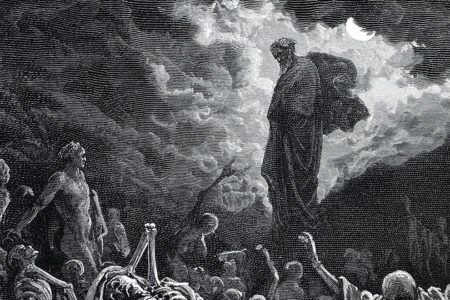We Will Hope
In what may be called a conservative expression of what has taken place between the Israelis and the Palestinian Liberation Organization, a “historic breakthrough” was announced on August 31, 1993. The revelation that secret talks in Norway between the two parties had produced a framework for the beginning of a settlement to the hundred year dispute between Palestinian Arabs and Jews elicited an outpouring of euphoric optimism seldom witnessed in the troubled Middle East. For some it heralded the beginning of an unprecedented era of peace. For others, on both sides of the line, it signaled a sellout that would mark a new round of fighting, bloodshed, and all-out war. Time alone will reveal who has correctly called the short-term results of the agreement signed in Washington, DC, on September 13, 1993.
I asked an assessment from a long-time Israeli friend who is a war hero, statesman, and highly respected member of the Jewish community worldwide. He thought for a moment and then replied softly, “We will hope.” There was no tending toward euphoria in his voice during our subsequent conversation. My friend has lived through it all in the decades-long Israeli experience and, in the process, has learned not to expect too much too soon.
But whatever we may feel or say about the continuing unfolding of the high-tension drama that is a perpetual condition in the Middle East, the outcome of the secret meetings in the dark woods of Norway is undeniably a historical watermark. It is certainly the equivalent of Anwar Sadat’s courageous visit to Jerusalem and the Egyptian-Israeli peace that followed. There are, in fact, many similarities to the driving forces behind Sadat’s peace with Israel and Yasser Arafat’s sudden new face toward his old enemies.
Intriguingly, the Soviet Union and Islamic fundamentalist extremists played key roles in the events of the period. Sick of war and faced with a staggering debt to arrogant Soviet overlords, Sadat fudged on his debt and summarily ordered the Russians out. His peace overture toward Israel assured Western economic support and endorsement, to say nothing of a unique niche in history. What was garnered for the Egyptian leader personally was a hail of bullets from Muslim fundamentalists who saw his peace with Israel as the consummate betrayal of the Islamic dream of wiping Israel from the face of the earth.
Why Now?
Legitimate questions are being floated about why Arafat and his PLO cohorts would suddenly do an about-face toward the Israelis. A companion query is whether he has changed his face at all and, in fact, is seizing the moment to use the agreement as a first step toward a Palestinian state that will become a launching pad for the annihilation of his perpetual enemy. Time magazine raises this possibility: “ … Arafat may have decided to make the appropriate peace gestures toward Israel—for now—in order to gain a foothold in the occupied territories, new funding (this time from the West) and a new chance to continue his 40-year war against Israel” (Time, September 13, 1993). Such a strategy would be consistent with Arafat’s previously stated “Peace of Saladin” approach, which is to make agreements in weakness, as the Arab warriors did with the Crusaders, until you become strong enough to destroy your enemies.
Arafat has been driven to extremes by the inexorable facts of life in a world that did not exist short years ago. First, the Soviet Union, his mentor/sponsor, bereft of clout or cash, is no longer a significant player. Next, he made a disastrous decision when he opted to support Saddam Hussein during the Gulf War. The outcome was the drying up of funding from Saudi Arabia, which necessitated drastic cutbacks in PLO financial aid to West Bank and Gaza enterprises. In addition to this was the rise in influence of radical Muslim fundamentalism in the territories. While extremist groups like Hamas and Islamic Jihad gathered strength, Arafat’s support in the territories fell to an estimated 35 percent. These factors combined to spell deep trouble for the chairman, so much so that some within the PLO were saying that the movement was finished. Thus Arafat, ever the opportunist, reached for the only available straw holding the potential to salvage his declining fortunes.
These realities were not lost on the Israelis. They too understood well the inherent dangers related to the rise of Iranian terrorist surrogates like Hamas, who posed a serious threat to the stability of life not only in the territories but within Israel proper as well. Yasser Arafat and his PLO, dedicated terrorist that he had been, seemed the better of two difficult courses. This, along with other militating factors, impelled both sides toward a the-time-is-now sense of urgency that led to the agreement and mutual recognition.
Dangers to Be Faced
Opposition to the signing of the accord agreement has been swift and raucous. And, as details are developed, opposition is certain to become even more boisterous. No one expects this process to be an easy road. Likud opposition party leader Benjamin Netanyahu accused Yitzhak Rabin of “threatening the security and freedom of [his] own country.” From the other side come ominous words from Democratic Front for the Liberation of Palestine spokesman Souheil Natour: “We want the liberation of the whole of Palestine, not just part of it.”
There is no doubt that, like Anwar Sadat before him, Yasser Arafat has placed his life on the line. In the immediate aftermath of the announcement of the signing, Ahmed Jabril, an extremist Palestinian warlord with ties to Iran, threatened to kill Arafat. Abu Mohammed, a wanted Hamas activist, said, “If Israel leaves, Gaza will become like Lebanon. There will be civil war.”
To protect against such potential violence, a Palestinian police force has been training outside the occupied territories, principally in Jordan and Egypt. Sources inside Israel express the fear that such forces could seed an army to be used against Israel in the future.
Quite another danger is posed in unrealistic aspirations on the part of Palestinians. An example of this is the issue of the return of refugees. Of course, returning all displaced Palestinians to claimed properties within Israel is as unattainable as the return of properties to Jews displaced from Arab countries during the periods of population exchanges in the early days of Israeli statehood. Nonetheless, the demand will be made and poses future problems.
Peace, Peace
Without question, the inner force behind all of this is the desire for peace. Palestinians are wearied with closed shops, Arabs killing Arabs, and having their daily lives regulated by Israel. Israel, for her part, is tired of war, debilitating military demands, and the perpetual threat of attack with the intent to annihilate.
If the agreement with the Palestinians holds the hope—which it appears to do—that Jordan, Syria, and Lebanon will follow their lead and recognize Israel’s right to exist, many within Israel and the Palestinian community will rest easier and live in the hope of better days. But will it happen? Shimon Peres, who, in the early stages of the process, was the prime Israeli mover, believes so. “Once we shall be over the disputes of the past, all of us will join forces to build a new Middle East like the United States or Europe: a continent or region of great tolerance, of real freedom, of science, of education and understanding.”
The Israeli Foreign Minister’s statement has the ring of a realm not of the real world in today’s chaotic international community. In the region of which he speaks in such idyllic terms, there has been precious little “great tolerance” or “real freedom.” It is a painful matter of record that of the sea of Arab nations in which Israel seeks to survive, there is not one democratic regime, beside Israel itself. And the order of the Islamic world has been anything but an impeccable example of “great tolerance” and “real freedom.”
In reality, the hope—which is, by the way, legitimate and desirable—sounds rather like that cry prophesied in the Scriptures of a time when people, frayed by adversity and grasping empty promises, will cry, “Peace and safety” (1 Th. 5:3), only to be smitten by even more devastating calamity. This speaks, of course, of a day in the future that will see a world gripped by consummate trauma, a day that will demand that God step in or the planet perish.
Again and again in press releases from a variety of official and unofficial sources, there has been mention of a new attitude emerging. And while we would hope this to be the case, in the present circumstances changed attitudes can only be produced by those who truly long for a change to come about. We need not stretch the point to understand that among the parties involved there is but a remnant who truly desire to change their basic attitudes toward their former enemies. If this remnant is significant in size, perhaps a measure of hoped for stability will be created. And we can all, with my Israeli friend, say, “We will hope.” But viewing things as they are in the real world of Muslim religious fanaticism, and assessing the blind rage of revenge that is the lifeblood of radicals, the watchword must continue to be strength, vigilance, and the will and wherewithal to survive.
Grasping the Certainties
Israel makes the point that at the interim stage of this process, no commitments have been made to relinquish land. Any possible concessions will be negotiated at the permanent agreement stage. And while these concessions seem inevitable at this point, we are quick to recognize that this will be the most volatile point of contention. The Arabs will, for their part, demand all of the West Bank, Gaza, and East Jerusalem. This, they will further insist, must comprise a new Palestinian state in addition to the one that already exists in Jordan—created as such by the British in 1921. Determined numbers of Israelis will never agree to this peacefully, as they view security and their inherent right to the land of their fathers as non-negotiable issues.
In this regard, they stand on firm biblical grounds. And while this may seem of little monument to secularists seeking accommodation for the short term, it is the star on the horizon of God’s ultimate plan for Israel and the Jewish people. Make no mistake about it, the land we know as Israel has been granted to the descendants of Abraham through Isaac as a permanent possession: “And the Lᴏʀᴅ said unto Abram … Lift up now thine eyes, and look from the place where thou art northward, and southward, and eastward, and westward, For all the land which thou seest, to thee will I give it, and to thy seed forever” (Gen. 13:14–15; cf. Gen. 27:7–8, 19, 21; 21:23; 26:1–3).
This grant has never been abrogated, nor can it legitimately be bartered away. Some may, indeed, question the propriety of linking such considerations with what is taking place currently. But the fact remains that for biblicists—Jew and Christian—the promise stands. We longingly anticipate the day when the Messiah will return and settle reconciled Israel in the land of promise, which will sweep from the little River of Egypt to the Euphrates, and all attitudes will be constructively united and live in true peace in the reality of what He has brought to pass. In the meantime … “We will hope.”








